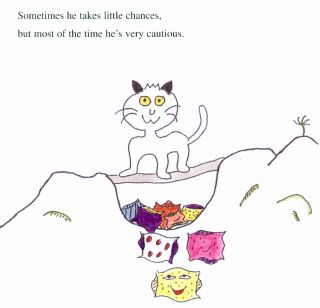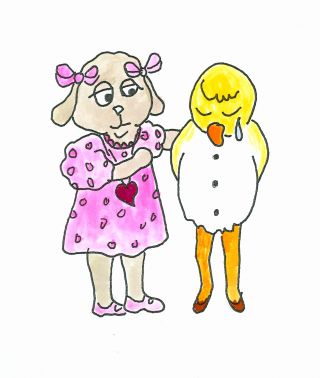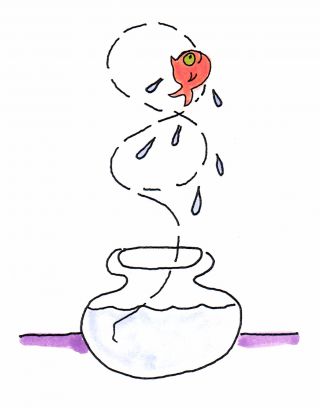

Stevie 6 from "Finding the Birthday Cake"
A question you might hear from an Enneagram type 6, the Questioner, is “What if it hurts?” or “What if it kills me?” This Questioner cat is smart and takes precautions. Some Questioners, however, hide their fear and attack before what they fear can hurt them.
In my Psychology Today blog of 8-20-12 I talked about three common defenses people use to avoid feeling grief: excessive worrying, excessive doing, and spacing out. We tend to use the same defenses to avoid feeling fear. It’s important to feel our feelings, though, in order to achieve peace.
Questioners are likely to fret as a defense from fear. Adventurers are known for staying busy and happy to avoid fear. They may also space out or indulge in pleasurable habits to excess. We Observers tend to fret also and I try to avoid situations likely to frighten me. These three types are in the fear center of the Enneagram.
When I assessed the quiz for identifying children’s type in Finding the Birthday Cake - Helping Children Raise Their Self-Esteem, none of the kids tested as the fearful, Questioner personality. Those who were Questioners had identified themselves as the happy-go-lucky Adventurer type instead. At age 8 or 9, they didn’t want to think of themselves as fearful. So I took out all the fear words in the test and now it produces more accurate results.

A Helper soothing a Perfectionist

An Asserter goldfish
Sometimes I wonder why some people go to such great lengths to cover up their fear. When I started giving book talks, I was terrified. I tried every method of calming my nerves I could think of, including hypnosis, therapy, and Toastmaster’s. What worked best was to tell the audience I was afraid. By laying my cards on the table I no longer had to struggle to keep a secret and cover up my true feelings. The audience didn’t run away, my nerves calmed down, and I was able to go on with my talk. After some honesty and experience, I was able to speak in front of crowds with confidence.
Some people trace their fear to a fear of death. Psycho-analyst Dr. Alexander Lowen, however, believed fear could be traced to the fear of life. ”Fear of life can be seen in the way we keep busy so as not to feel, keep running so as not to face ourselves, or get high on liquor or drugs so as not to sense our being. Because we are afraid of life, we seek to control or master it. We believe it is bad or dangerous to be carried away by our emotions. We admire the person who is cool, who acts without feeling… The modern individual is committed to being successful, not to being a person. He belongs rightly to the ‘action generation’ whose motto is do more but feel less.” (From Fear of Life.)
Dr. Carl Gustav Jung noticed people became neurotic when they contented themselves with attaining position, marriage, reputation, outward success or money but didn’t fill their lives with sufficient content and meaning. When they did, he said, the neurosis generally disappeared.
It takes time and commitment to self-honesty to access one’s most authentic feelings, but the payoff is huge. If you’re a parent, encourage your children to discover what they value individually. Also ask them questions of preference and respect their answers regardless of how different your own answers would be. This will lay a foundation for personal meaning to their lives.
Please visit my improved Famous People page and subscribe to this and my other blog.

